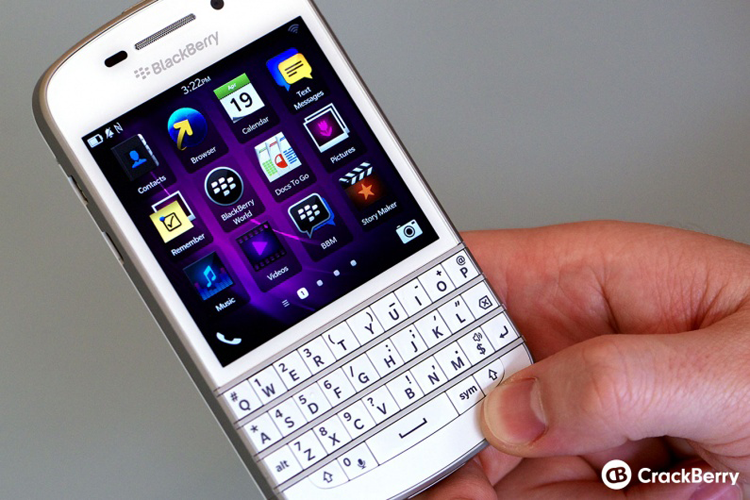
You know, I've always had a soft spot in my heart for BlackBerry phones, mostly because it was such an iconic device of my early days in high school, right before it was cut off abruptly by the success of the iPhone. Even when the iPhone came out, you had a decent amount of people that were hell-bent on sticking with BlackBerry for the physical keyboard. It was what we had gotten used to, and even now I can admit that sometimes I miss the satisfactory click! a physical button could provide over a substitute like tactile feedback. But even as Android came about, which served as a sort of in-betweener for the two by offering both touchscreen-only devices and touchscreens with physical keyboards, it's rare to find an Android these days that offer a physical keyboard. If you're looking for a phone with a physical keyboard, you really only have one option, and that's BlackBerry.
But do people even want a physical keyboard anymore?
Sure, some people do. But the fact of the matter is that most people have adapted quite well to touchscreen keyboards since its inception, and it's hard to deny the benefits that they can bring to a smartphone. They appear when we want them, they disappear when we don't. You can use them to type like you would on a traditional keyboard, or you can type faster and (sometimes) more efficiently using alternatives like Swype, Minuum or Fleksy. You don't have many alternatives with physical keyboards, and although there are people who definitely still prefer a physical keyboard, the numbers of people who are loyal to them are dwindling. And honestly, it kind of seems like the king of physical keyboards, BlackBerry, is only pushing them to move on at this point.
A report from the Wall Street Journal reveals that the sales of the BlackBerry Q10 have been abysmal since its launch. The Q10 was the second device to launch in BlackBerry's revised OS, BlackBerry 10, which was supposed to lift BlackBerry up to modern standards in the smartphone industry. The Q10's job was to give people who wanted that physical keyboard aspect in a smartphone incentive to use BlackBerry 10; it was a solid mix of old and new. Honestly, I thought it was a good marketing ploy... until I saw the price. For the specs that it gives, although not bad, it is not exactly what I would consider worthy of $199.99 compared to other devices on the market that can offer more, both on the hardware and software levels. With adoption of phones with physical keyboards being so low, I feel like BlackBerry might have been heading in the wrong direction when it came pricing of the Q10.
I think the BlackBerry Q10 could have done better if it was priced more moderately. After all, the Q10 really had nothing fantastic going for it other than the fact that it had a physical keyboard. The camera is standard, the specs are standard, the OS was (and still is) a work in progress; $199 just feels like it's asking for too much for a device with an outdated "main feature". I feel like the Z10 got away with such a price (barely) because it featured a design that people prefer now-a-days - a design that people are willing to adopt. Even then, the more popular (but not by much) Z10 has already received a price drop to $99, and even $49 in some cases. But the Q10 is still being sold with a $199 price tag. Even as a niche product, $199 seems like too high of a price for people to want to pay just to get a physical keyboard. I think BlackBerry was right about them being in control of smartphones with QWERTY keyboards, but I think they were wrong in just how much people are willing to spend to get such a feature. Between the price and the current state of BlackBerry, I think people are reconsidering just how important a physical keyboard is to them in a smartphone.
In short, I think that BlackBerry kind of doomed itself when it came to the Q10. BlackBerry was already having delusional pricing problems before BlackBerry 10 was out, especially in the case of the BlackBerry Bold 9900 series - $250 for a BlackBerry 7 device. Really? But at least, at the time, they had cheaper alternatives like the BlackBerry Curve line. For BlackBerry 10, at least in the U.S., there is no cheaper alternative for a BlackBerry 10 device with a physical keyboard. The Q10 is it. For a company that's trying to get back in the game, you just can't aim that high to start off with with a device like the Q10. Their unwillingness to back down from the price isn't helping, considering that the device is set to release on Sprint tomorrow for the same $199 price. Why do they keep insisting on selling this device that nobody is willing to pay for at $199? Given that the device is being sold nearly 3 months after its debut in the U.S., the device should at least debut for $99 on Sprint. It could probably use a price drop every else, too.
Readers, what are your thoughts on the Q10? Do you think that this physical QWERTY keyboard device with mid-range specs is worth the $199 price tag, even for niche markets? Would you be more interested in it if BlackBerry lowered the price on it? Are you even interested in devices with physical QWERTY keyboards anymore? Let us know your thoughts in the comments below!
Images via CrackBerry, N4BB